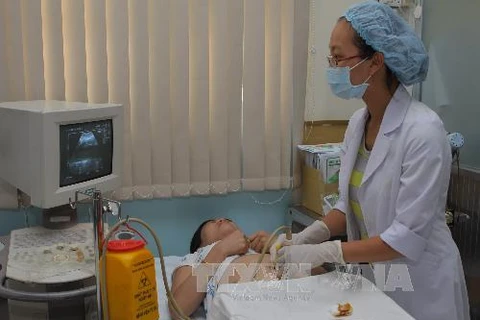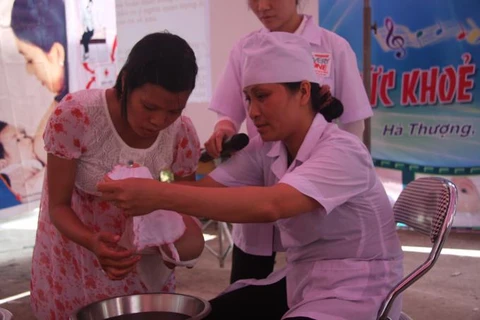 Delivering family planning consultations in Bong Khe commune, Con Cuong district of Nghe An province (Photo: VNA)
Delivering family planning consultations in Bong Khe commune, Con Cuong district of Nghe An province (Photo: VNA) Hanoi (VNA) – The family planning work has contributed to stabilising the scale, structure and quality of the population, according to Deputy Health Minister Nguyen Viet Tien.
Tien made the statement at a workshop to announce outcomes of a survey on the quality of family planning services in Vietnam jointly held by the Heath Ministry and the UN Population Fund (UNFPA) in Hanoi on May 8.
The survey gathered responses from households and 6,000 women aged from 15-49 from Hanoi, the northern mountainous province of Yen Bai, the central province of Phu Yen, Dak Lak province in the Central Highlands, and the southern provinces of Dong Nai and An Giang in 2015-2016.
It reveals that up to 80.5 percent of married women aged from 15-49 are using a contraceptive method.
Although 64 percent of them are using modern methods of contraception, 37.8 percent did not consult medical workers before their use.
The number of women using contraceptive methods in urban areas is higher than that in rural areas, with the highest rate recorded in the southeastern region (83.4 percent) and the lowest rate seen in the Red River Delta (75.1 percent).
About 17.4 percent of the correspondents said that they had abortions, with 19.6 percent reported in urban areas and 16.5 percent in rural areas.
The report said the surveyed communal medical centres have adequate infrastructure, equipment and human resources necessary to ensure the provision of family planning services.
However, only 9.7 percent of them fulfilled all the 25 indexes set. Of note, none of them in the north central, south central coastal and Central Highlands regions meet the index of readiness.
A number of the medical centres failed to satisfy the index regarding the supply of contraceptive methods such as tablets, condoms and intrauterine contraceptive device (IUD).
Up to 93 percent of the interviewees said they are satisfied with family planning services. However, only 40 percent of them said they will introduce the services to others.
The report on the survey’s results will be used as a reference for policy makers, programme managers, health experts and researcher to implement relevant programmes, helping Vietnam completing sustainable development goals (SDGs), said Deputy Minister Tien.-VNA
VNA























